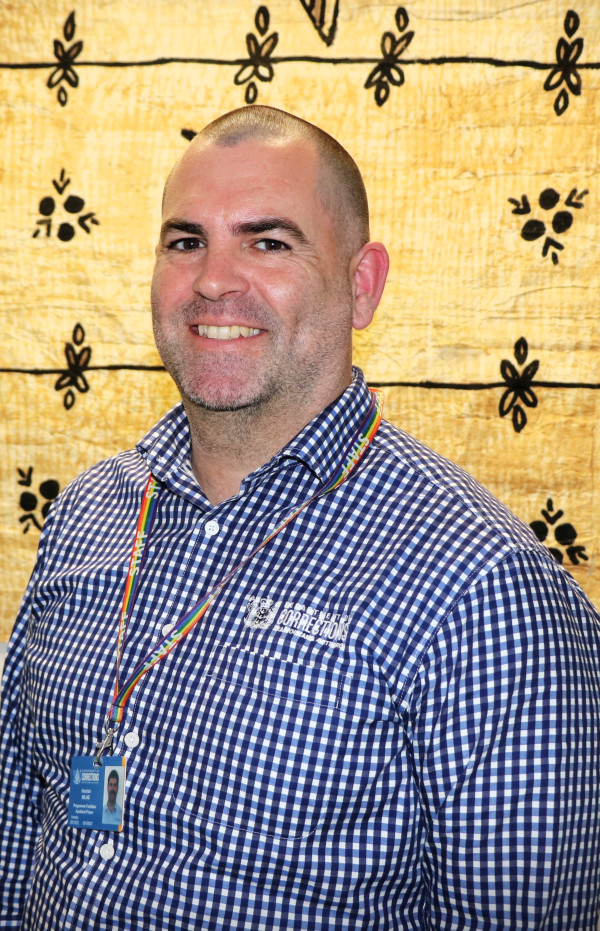9 February 2023
Helping People Steer Clear of Re-offending - Hamish, Programme Facilitator

The Auckland-based Programme Facilitator works with people to help them find strategies to address their offending.
STARTING OUT
Hamish started out by completing a Bachelor of Arts in History and Political Science followed by a Postgraduate Diploma in Public Health.
He had a friend who was running Stopping Violence programmes with an organisation in Hamilton so he started doing that a couple of times each week.
“It was just a part-time job. So once or twice a week I was running these men's groups and just really enjoyed it. And eventually I just realised, I'm actually enjoying this more than my day job.
“I saw a friend in Christchurch who I had studied public health with and we'd done similar sort of work. I knew she was working for Corrections. I got talking about these other men's groups and she's like, "You should join programmes." Turns out she was in this similar role and I just sort of went from there.”
His first year in Hamilton was based in the community and by 2016, he was in Auckland.
THE ROLE
He is supervising people in Auckland Prison and across two different probation sites.
“The team that I'm in is part of what they call medium intensity, which means that we work with the medium risk band of people. We work across different offence types.
“The evidence shows we don't really need to intervene with low risk offending. An example might be drink-driving. So, someone who drink drives may respond well to the initial penalty of losing their licence for a while. That's effective. The evidence would say we don't need to do further treatment.
Someone on a third drink-driving offence, is automatically in our category because it suggests that there's other stuff going on there. They haven't responded to that minimal sort of intervention.
“And then there's programmes that have more behavioural skills. They might be people with a maximum security classification. They might not be able to mix with many people. So, we have a programme for them and motivational stuff that we do one-on-one.”
The men are interviewed for their suitability for the programmes to find out if it matches their needs and if they are motivated enough to do it.
“Then there’s what we call a short rehabilitation programme, similar content, but it's quite condensed. There is another one with a youth focus and a women’s programme.”
The overall goal is helping them not to offend in the future.
SATISFYING MOMENTS
When people complete the programmes, Hamish and the other programme facilitators hold a small graduation ceremony where whānau members can come along and be part of it. He says some of his most satisfying moments come from these graduations.
“Seeing guys who have come through our programmes, and just how proud they are when they're talking about what they've done, to their whānau. One that immediately comes to mind, would be early 2020. One of the men’s kids, who must have been a toddler, joined us.
“We welcomed in the manuhiri, guest side, and this kid comes running across to his dad, who did his mihi to everyone holding his kid. That was amazing.
“Often it's just the fact that they're people that we've been hearing about for three months. You get to see a genuine interaction with their whānau, which is also cool, because just as much as you heard all about it, you just don't quite know how that's going to go in person.
“There was another guy, with a long offending history, in and out of prison. And, it was another one of those breakthrough moments where he seemed really stuck in having two ways of dealing with things: one was extreme violence, the other was feeling like he was getting completely walked over.
“And, I actually then had the good fortune of being able to have him on the actual rehab programme, and just the change you could see in him. His son had never seen him do a haka or anything like that. So, that was amazing.
“Yeah, I think it's seeing people just really trying to make changes. Whether we are the first people that have listened, or they just haven't had an opportunity to tell us that they just feel heard.”
RAINBOW NETWORK
Hamish is also a rainbow champion for Auckland Prison.
“A general queer and allies sort of network. I call myself a ‘go-to gay’, he says.
“If there's staff who have got questions around anything to do with sexual orientation or gender identity-related stuff. Pronouns, there's a trans prisoner policy. It's just to be a visible extra resource.
“I just have to be part of it. I’m also super cynical, so I need to keep my eye on it and make sure that they're not just pinkwashing things. I’m going to put my hand up and try and make things better whether it's queer staff or people under our management as well.
“I've done a lot of work in Pride spaces previously. I can be loud and annoying and other people might not be. So that's something I can do.”
Ready to make a move?
Start your journey - check out the a list of our current opportunities then apply online today!